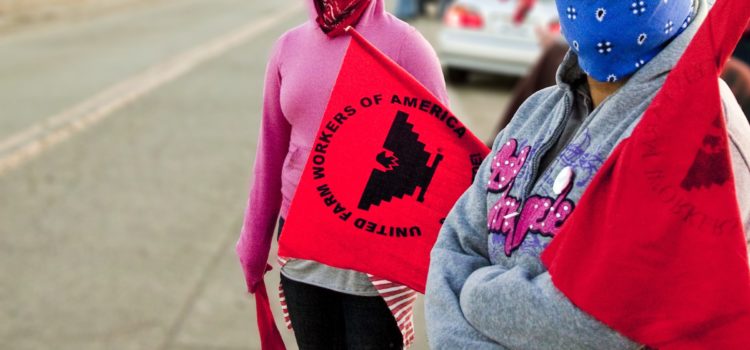

In his fifteenth installment, our blogger expresses the respect he feels for mujeres campesinas, the female farm workers he comes across daily. PHOTO: Jesús E. Valenzuela Félix
The Diary of Joaquín Magón Entry 15: An Open Letter to La Mujer Campesina
Mujer,
Not a day goes by that I am not fascinated by your struggle. Your hands that swipe and cut, your hands soothe and heal; your smile conceals what your eyes cannot. The selfless strife, the dreams that swirl from your imagination and dance into the dreams of your children for whom you work so hard. And although I cannot relate completely, I have learned a few things from you and recite them here.
Mujer campesina, this letter is to you.
I lean against a wall in a meeting hall in Oxnard. They are all here, farm workers, uprooted, traveling, dignity trampled but not destroyed. A campesina speaks of being pregnant, of lifting heavy boxes in the midday sun, of not getting water, of not being allowed to use the restroom, of being forced to work faster and faster; she speaks of the eternal pain of losing her child. A knot in her throat unwinds and tears fill her eyes. She had been silent for a long time. She won’t be anymore.
Her tears run, they play on her cheek and smile. There is this space, an empty space in the palm of her hands that tears try to fill and solidify so as to make a newborn child; but they slip away and no matter how much they slip away they do not wash away the space, the question, the fact that her child is not there.
Who would he have been? Would she have been a lawyer? A poet? All those things she thought about, things she put away in poetic jars to one day give to her children sit now as a question and not an answer.
And when another campesina speaks, I realize that there is a reason she works with her head covered with two bandannas like a hijab. I assumed for the longest time that it was to protect herself from the sun since all you can really see are her eyes. And one begins to realize that it’s to protect herself from men- especially if she is pretty.
Because she know that when the day begins, her husband is sent to the left and she to the right and when the foreman does this he smiles and looks at her with those eyes she has learned to distrust- eyes of hunger, eyes that dehumanize her soul, devalue the body as an object of his pleasure. And so you learn, campesina, to be disgusted by those eyes, to hate those eyes, to fear those eyes because they follow you up and down those rows, into the supermarkets, and through the streets, those eyes cause a fear and a distrust that you internalize as normal.
The eyes of all the women in that Oxnard hall who had been looking down, staring off into a distant memory, thinking of something else, anything else but this, have begun to focus, they have begun to look up. They continue to speak of the struggle and how hard it is to just be able to work and to feed their children and that they want to come together so that the daughters that step into the fields will not be dehumanized. And she can just work, just work, simple.
Little by little that fear that over time froze their pain over to numb it away and keep it silent and distant without the need to heal (because to heal is to remember) has begun to melt, and in that small, split, invisible, almost insignificant second the defiance and resilience, a voice that was found in the depths of their souls old patriarchs denied that existed, they decided that that was going to stop.
And with that they smiled. They smiled and a laugh escaped them because they were told they could. In a society where life had been denied to them, they were told that they could, indeed, defend themselves. In the small seconds that followed you could see their eyes were not the same. Sure, their color was still that beautiful black, but they were focused, they shined and they smiled.
It is important to note, that none of this hope, none of this courage, was given to them. They had it inside them. It was born when they were born. But it was suppressed. And it continued to be suppressed down to a place to where they had forgotten. But it is theirs, it is only theirs, no one can take it. Sure someone can break it, rip it to shreds, scatter it through out their hearts and mind, but it is still there. It cannot be destroyed, it can only be created once, but it can grow, it can oscillate like the universe, and it can engulf all sadness and doubt.
So this letter is to you, mujer campesina, whom I appreciate for your struggle, for your strength; and it is for you whom I pledge to continue this struggle for.
In the simple words of Dolores Huerta- ¡Que Viva La Mujer!
“The Diary of Joaquín Magón” is written by Jesús E. Valenzuela Félix, a reporter from Coachella living in Salinas and working for the United Farm Workers. He contributes blogs regularly for Coachella Unincorporated.